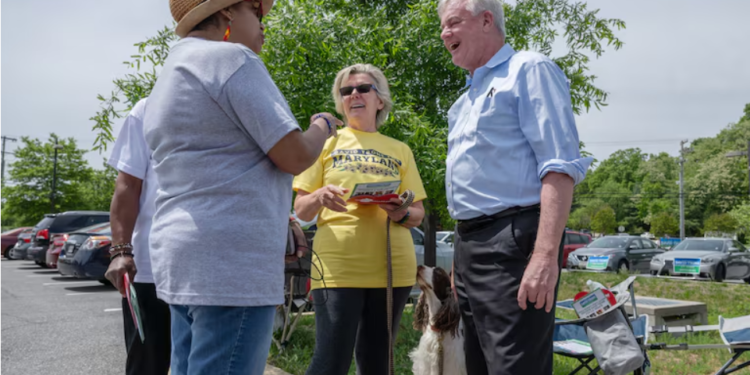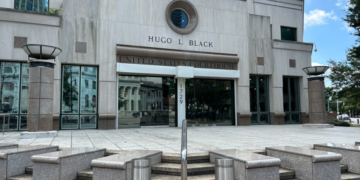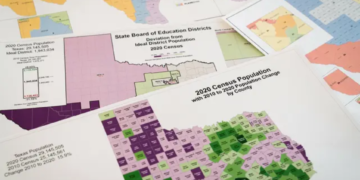Representative David Trone (D-Md.) engages in conversation with campaign volunteers in Laurel, Maryland, on May 3rd. (Photo by Craig Hudson for The Washington Post). Img source: .washingtonpost.com
May 15, 2024 Story by: Editor
As the Maryland U.S. Senate primary campaign draws to a close, Prince George’s County Executive Angela Alsobrooks is rallying with fellow Black women to bolster her potentially historic bid and propel herself closer to the pinnacle of America’s political hierarchy.
With nearly one in three of Maryland’s over six million residents being Black, the state stands as one of the most diverse on the East Coast, with a predominantly blue electorate that has elevated Black individuals to significant positions of authority but has yet to send one to Congress’ upper chamber.
Alsobrooks’s quest to become the state’s first—and the nation’s fourth—Black woman to serve in the Senate has elevated her identity to the forefront of a crucial contest, pitting the local official against a well-funded three-term Congressman.
Glynda C. Carr, president, CEO, and co-founder of the Higher Heights for America PAC, highlighted Alsobrooks’s potential impact, emphasizing her lived experiences as a woman, a Black woman, and a mother, traits that supporters believe will bring unique perspectives to Washington. Source: Washington Post
The outcome of this hotly contested May 14 primary will bear the weight of safeguarding Maryland’s reliably Democratic seat, with the GOP eyeing the opportunity to bolster their candidate, former governor Larry Hogan, in a bid to shift the Senate’s balance of power.
The primary battle showcases a stark contrast: Rep. David Trone, a White businessman with liberal credentials, faces off against Alsobrooks, a Black woman county executive, underscoring broader tensions within Democratic circles regarding the urgency of enhancing representation.
While Trone’s experience and financial resources offer strategic advantages, Alsobrooks’s candidacy represents a potential breakthrough, transcending barriers in a state where Democrats vastly outnumber Republicans.
Navigating her historic campaign adeptly, Alsobrooks has refrained from explicitly discussing race, opting instead to focus on gender representation, motherhood, and the need for a diverse congressional delegation that reflects Maryland’s demographics.
This strategy of “deracialization,” as described by political science professor Ayana Best, has been effective for Black female candidates, allowing them to appeal to a broader electorate while retaining a sense of authenticity.
Trone has garnered support from prominent Black leaders, emphasizing his outreach efforts and commitment to social justice issues, but faced criticism for his public comments, including the use of a racial slur, which have highlighted differences between him and Alsobrooks.
The clash between Trone and Alsobrooks underscores the complex dynamics at play in Democratic politics, with voters divided over which candidate can best represent their interests and defeat Republicans in November.
For Bowie resident Gina Winchester, Trone’s financial investment in his campaign demonstrates a commitment to fighting for victory, while Silver Spring resident Rhona Campbell sees Alsobrooks’s candidacy as a crucial step towards diversifying government leadership.
As the primary race nears its conclusion, Alsobrooks has secured endorsements from top Democrats, positioning herself as a pragmatic leader with a track record of delivering results for her constituents.
While some voters express reservations about Trone’s comments and approach, others, like Yolanda Patterson, ultimately base their decision on perceived respect and inclusivity, factors that influence their vote in a contest that transcends mere party politics.

















